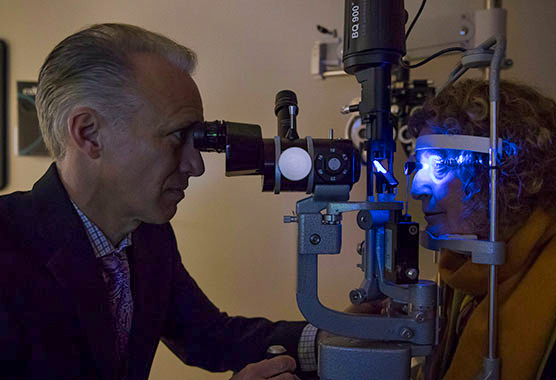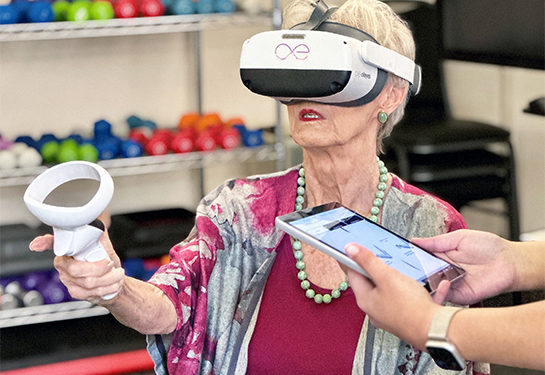Eyelid Disorders
Our team of board-certified ophthalmologists has specialized training and advanced technology to treat both common and rare eyelid disorders.
Medically reviewed by Jeffrey Ma, M.D. and Lily Koo Lin, M.D. on Oct. 12, 2023.

Care for Eyelid Disorders and Conditions
At the UC Davis Eye Center, we combine renowned expertise with state-of-the-art equipment to provide the highest level of ophthalmic care.
Eyelid Disorders and Conditions
Conditions that affect your eyelids range from common inflammation to lesions and malposition. Eyelid disorders can also be associated with muscular or nerve conditions.
Common eyelid disorders include:
- Blepharitis
- Dermatochalasis
- Eyelid Lesions
- Stye (hordeolum)
You may understandably be concerned if you have any problems with your eyelids. The good news is that most conditions won’t cause serious or long-term harm.
Symptoms of Eyelid Disorders
An eyelid disorder can cause symptoms ranging from mild to severe. Your symptoms will vary according to your condition.
Common Symptoms
The most common symptoms of an eyelid condition include:
- Burning
- Drooping of an eyelid
- Crusty buildup on the skin
- Growth or bump
- Inflammation or swelling
- Itching
- Redness
Emergency Symptoms
Get medical help immediately if you have any of the following symptoms:
- Blurred vision
- Facial paralysis
- Sudden weakness in facial muscles
- Vision loss
Common Causes of Eyelid Disorders
Most eyelid conditions do not pose a threat to your vision or long-term health. Rarely, cancerous growths can cause conditions that require more urgent treatment.
Common causes of eyelid conditions include:
Abnormal Eyelash Growth
Sometimes, an eyelash can grow in the wrong direction. This can rub against your cornea and cause irritation and redness.
Allergies
Environmental or seasonal allergies can cause irritation and swollen, itchy eyelids.
Bacterial Infection
A bacterial infection can affect your eyelid, a hair follicle or a sweat gland and cause inflammation, itching, stinging and redness.
Clogged Oil Gland
An oil gland that becomes clogged can lead to meibomitis, a condition characterized by a thickened, crusty eyelid. Clogged oil glands also lead to formation of a chalazion, a type of cyst.
Congenital Conditions
Though rare, some babies are born with abnormal eyelids.
Excess Skin
Excess eyelid skin can droop over your eyes and occasionally obstruct your vision.
Skin Cancer
Skin cancer such as basal cell, squamous cell or melanoma can occur anywhere on the skin, including the eyelid skin.
Risk Factors for Eyelid Disorders
There are certain factors that can increase you risk for eyelid disorders, including:
Age
Some eyelid conditions, such as excess eyelid skin, can worsen with age.
Contact Lens Use
Wearing contact lenses can occasionally lead to an irritation that affects your eyelids.
Exposure to UV Rays
Spending time in the sun exposes your skin to dangerous UV rays. This increases your chances of developing skin cancer around your eyelids.
History of Skin Conditions
You are more likely to develop certain eye disorders if you have skin conditions like eczema, rosacea or seborrheic dermatitis.
Diagnosing Eyelid Disorders
Our Eye Center specialists are experts in diagnosing both common and rare eyelid conditions. To diagnose your condition, your provider will discuss your medical history and symptoms and do an eye examination.
They may dilate your eyes with drops before the eye exam. They will use a slit lamp (a type of microscope) to look at every part of your eye.
Treatments for Eyelid Disorders at UC Davis Health
The UC Davis Health Eye Center team is dedicated to protecting the health of your eyes with world-class, compassionate care. Your treatment plan will depend on your symptoms and diagnosis. Treatment options for eyelid conditions include:
Antibiotics
Your provider may prescribe an antibiotic ointment or oral antibiotic medication to treat eyelid infections.
Botox
Botox injections help relax muscle spasms in the face that affect your eyes. Botox can be provided by a neurologist or a neuro-ophthalmologist.
Surgery
Your provider may surgically remove benign growths, inclusion cysts or hidrocystomas. Biopsies are performed for growths suspected to be cancer. Surgery is also an option to remove excess skin from your eyelids and to correct eyelid malposition.
Warm Compress
Applying a warm compress to your eye can help clear conditions like styes and oil gland blockages. In-office thermal procedures may be recommended to help clear clogged oil glands as a treatment for dry eye disease.
Preventing Eyelid Disorders
You can prevent some eyelid conditions with healthy hygiene and lifestyle habits. Try to:
- Avoid allergens that irritate your eyes
- Clean your face with a gentle cleanser
- Completely remove eye makeup every night
- Don’t touch or rub your eyes
- Use sunscreen and sunglasses to protect your eyelids from UV rays
- Wash your hands throughout the day
Request an Appointment
As Sacramento's No. 1 hospital, you'll benefit from unique advantages in primary care and specialty care. This includes prevention, diagnosis and treatment options from experts in 150 specialties.
Referring Physicians
To refer a patient, submit an electronic referral form or call.
800-4-UCDAVIS
Patients
Call to make an appointment.
Consumer Resource Center
800-2-UCDAVIS
Eyelid cancer
5-10%Of all skin cancers occur on the eyelid
Source: Surgical Ophthalmic Oncology. Overview of Eyelid Tumors.

Ranked among the nation’s best hospitals
A U.S. News & World Report best hospital in cardiology, heart & vascular surgery, diabetes & endocrinology, ENT, geriatrics, neurology & neurosurgery, and pulmonology & lung surgery.

Ranked among the nation’s best children’s hospitals
U.S. News & World Report ranked UC Davis Children’s Hospital among the best in pediatric nephrology, orthopedics*, and pulmonology & lung surgery. (*Together with Shriners Children’s Northern California)

Ranked Sacramento’s #1 hospital
Ranked Sacramento’s #1 hospital by U.S. News, and high-performing in aortic valve surgery, back surgery (spinal fusion), COPD, colon cancer surgery, diabetes, gynecological cancer surgery, heart arrhythmia, heart failure, kidney failure, leukemia, lymphoma & myeloma, lung cancer surgery, pacemaker implantation, pneumonia, prostate cancer surgery, stroke, TAVR, cancer, orthopedics, gastroenterology & GI surgery, and urology.

The nation’s highest nursing honor
UC Davis Medical Center has received Magnet® recognition, the nation’s highest honor for nursing excellence.

World-class cancer care
One of ~59 U.S. cancer centers designated “comprehensive” by the National Cancer Institute.

A leader in health care equality
For the 13th consecutive year, UC Davis Medical Center has been recognized as an LGBTQ+ Healthcare Equality Leader by the educational arm of America’s largest civil rights organization.

